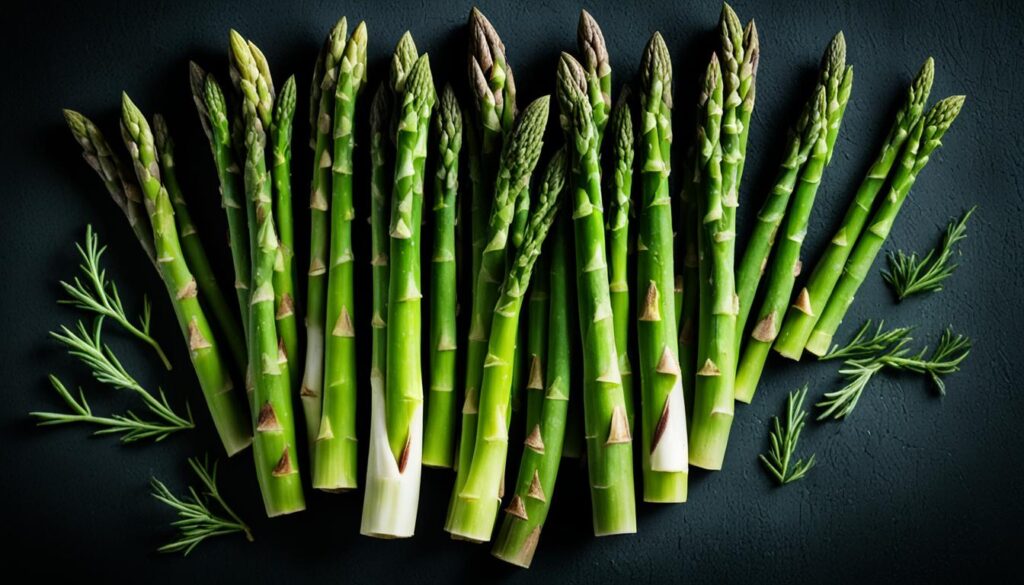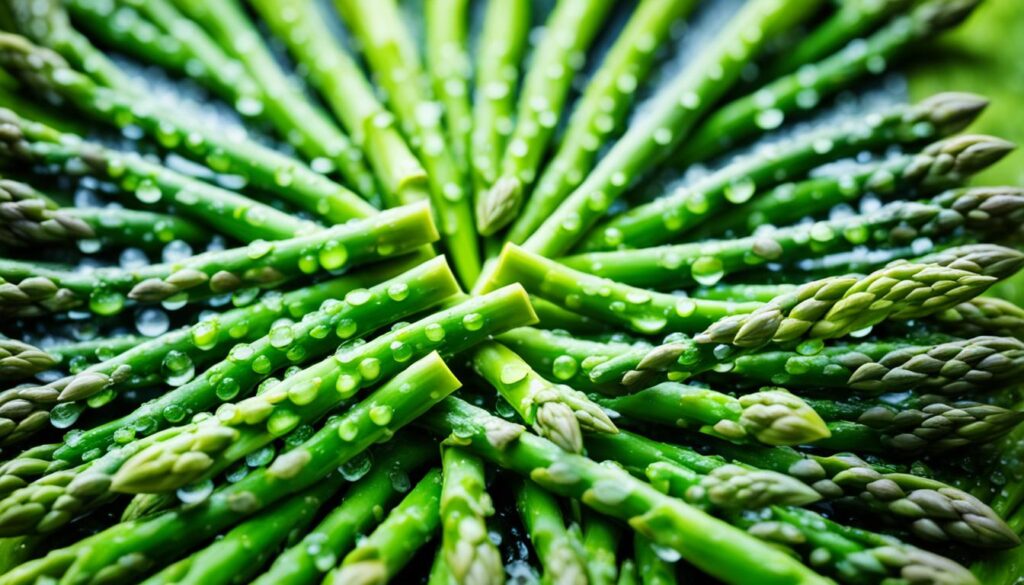Ever wondered why asparagus is a favorite? It’s not just tasty but also full of health benefits. As one of the first veggies to grow in spring, asparagus has been loved for centuries. Let’s dive into its amazing nutritional value and how to cook it.
Asparagus is packed with fiber and vitamins, making it a great choice for health. It can boost your wellbeing and make your meals more exciting. Let’s see how asparagus can improve your health and cooking skills.
Why Asparagus is a Nutritional Powerhouse
Packed with Vitamins and Minerals
Asparagus is a superfood full of important vitamins and minerals. A 100-gram cooked serving gives you 63% of your Vitamin K. It also gives you 37% of folate, 20% of Vitamin A, and 13% of Vitamin C. Plus, it has Selenium, Copper, and Potassium.
These nutrients are key for eye health, blood clotting, and helping the fetus grow. They also boost your immune system. That’s why asparagus is on WebMD’s list of «12 Powerhouse Vegetables You Should Be Eating.»
Rich in Antioxidants
Asparagus is full of antioxidants too. It has flavonoids, phenols, and sulfur compounds. These help fight off harmful free radicals in your body.
Free radicals can harm cells and DNA, leading to health issues like cancer and heart disease. Asparagus antioxidants fight this damage. They help keep you healthy and well. Studies show eating asparagus can improve your cholesterol, liver and kidney function, and eye health.

Asparagus for Digestive Health
Asparagus is tasty and good for your gut health. It’s full of fiber, which is key for a healthy gut.
Fiber for Better Digestion
Asparagus has two kinds of fiber: insoluble and soluble. Insoluble dietary fiber feeds the good bacteria in your gut. This keeps your gut healthy and helps you digest food well. Soluble fiber lowers cholesterol by removing «bad» LDL cholesterol from your body.
Eating asparagus can ease digestive issues like hemorrhoids, irritable bowel syndrome (IBS), and constipation. Its fiber keeps your digestive system running smoothly, avoiding discomfort.

Asparagus is also packed with prebiotics, which feed the good gut bacteria. This keeps your gut flora balanced, supporting your digestive health.
For better gut health and digestion, add more asparagus to your meals. Enjoy it roasted, grilled, steamed, or sautéed.
Asparagus and Heart Health
Asparagus is tasty and good for your heart. It has insoluble fiber that keeps your heart healthy.
Asparagus helps your heart by binding to cholesterol in your gut. This stops it from being absorbed. Lowering cholesterol helps prevent artery blockages.
Asparagus is packed with potassium, vital for heart health. Potassium helps control your heartbeat and blood pressure. Eating asparagus can make your heart strong and healthy.
| Nutrient | Amount in 1 Cup of Raw Asparagus | Percentage of Daily Value |
|---|---|---|
| Calories | 27 | – |
| Carbohydrates | 5 grams | – |
| Fat | 0.2 grams | – |
| Fiber | 2.8 grams | 11% |
| Vitamin K | 56 micrograms | 46% |
| Folate | 70 micrograms | 18% |
| Iron | 2.89 milligrams | 16% |
| Potassium | 271 milligrams | 8% |
Eating asparagus can give you many heart health benefits. These include lower cholesterol, better blood pressure, and overall heart health.

The Benefits of Asparagus for Pregnancy
Asparagus is a superfood that’s great for pregnant women. It’s packed with folic acid, which is key for your health. Eating just a little asparagus gives you a lot of this vitamin.
This vitamin helps prevent anemia and other health issues. It also lowers the risk of premature birth. So, it’s a big plus for your baby’s health.
Asparagus isn’t just about folic acid. It’s full of vitamin K, which is important for blood clotting. This can prevent serious health problems for both mom and baby.
It also has fiber, which helps with gestational diabetes and constipation. This makes it a great choice for pregnant women.
Asparagus is also hydrating and has low sodium, which is good for you and your baby. It has calcium too, which is great for your baby’s teeth and bones. Eating asparagus might even lower the risk of miscarriage and other pregnancy problems.
But remember, make sure to clean and cook it well to avoid foodborne illnesses. Some people might get bloating or gas from it, so eat it in moderation.
In short, adding asparagus to your diet is a smart move. It’s full of nutrients that are great for you and your baby. So, enjoy it and reap the benefits.
| Nutrient | Amount in Asparagus | Benefit During Pregnancy |
|---|---|---|
| Folic Acid | 44.6 mcg per 100g | Helps prevent anemia, birth defects, and premature birth |
| Vitamin K | 44.6 mcg per 100g | Aids in blood clotting, preventing hemorrhage complications |
| Fiber | Rich in insoluble and soluble fiber | Supports digestive health and can help manage gestational diabetes |
| Calcium | 20 mg per 0.5 cup | Promotes the development of the baby’s teeth and bones |
Asparagus: Nature’s Mood Booster
Asparagus is more than just tasty and versatile. It’s also a natural way to boost your mood. This plant is full of folate, a B vitamin that helps your mental health.
Folate for Mental Well-being
Studies show that low folate levels are linked to depression. Doctors now give vitamins to help with mood issues. Asparagus could be a natural way to feel better.
Folate is key for making neurotransmitters like serotonin and dopamine. These chemicals help control your mood and feelings. Eating asparagus can keep your folate levels up. This might make you feel happier and less irritable.
A study in India Today found a 20% increase in mental illness since the COVID-19 outbreak. This shows we need natural ways to boost our mood. Asparagus is one such food that can help.
Next time you want to improve your mood, try asparagus. It can be grilled, roasted, or added to many dishes. This veggie might help you feel more positive and happy.
Cooking Tips to Enjoy Asparagus
Asparagus is a versatile vegetable that can be prepared in various ways. You can roast, grill, or blanch it to enjoy its delicious flavor and crisp texture. Roasting asparagus at 425 degrees for 12 minutes makes it lightly crisp and tender.
Grilling asparagus on a medium preheated grill for 6 to 8 minutes gives it a tender and lightly charred finish. For a quick and easy option, blanch asparagus by boiling it for about 1 minute in salted water. Then, chill it in ice water for 1 minute.
Asparagus can be added to many dishes. Put it in your scrambled eggs, with pasta, or in refreshing salads. You can also make frittatas, soups, and stir-fries with it. Since asparagus is in season from March to May, now is the best time to try different cooking methods and recipes for this nutritious and tasty seasonal vegetable.
Whether you like your asparagus roasted, grilled, or blanched, the main thing is to cook it until it’s tender but still a bit crunchy. With some experimentation and creativity, you can enjoy asparagus in many delicious preparation ways during the spring season.



